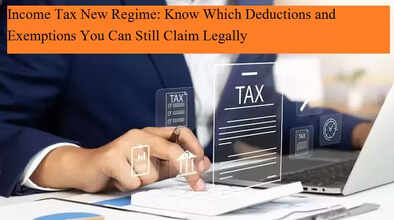Income Tax New Regime: Know Which Deductions and Exemptions You Can Still Claim Legally

Income Tax Alert: New Regime Still Allows Select Deductions—Here’s How You Can Maximize Tax Savings
Many taxpayers believe that by opting for the new income tax regime, they must forgo all deductions and exemptions that were earlier available under the old regime. While it’s true that most standard deductions under sections like 80C, 80D, and 24(b) are not applicable under the new system, some specific tax benefits are still permitted. If you’re planning to switch or have already chosen the new regime, here’s what you need to know to legally reduce your tax liability.
What’s Different in the New Tax Regime?
Introduced as a simplified version of the old tax structure, the new tax regime offers lower tax rates with more slabs, and no requirement for investment proofs or tax-saving declarations. Salaried individuals and pensioners earning up to ₹12 lakh annually can now enjoy tax-free income. However, the trade-off is the removal of most common deductions. Still, a few critical benefits continue to exist.
1. Employer Contribution to NPS is Still Deductible
One of the lesser-known deductions still available under the new regime is the employer's contribution to the National Pension System (NPS). While employee contributions under Sections 80C and 80CCD(1B) are not allowed for deductions in the new regime, Section 80CCD(2) still applies.
Under this, the employer’s contribution of up to 14% of basic salary plus DA for government employees (or 10% for others) qualifies for deduction. However, the total tax-free benefits from the employer towards retirement schemes (including EPF, NPS, superannuation funds, etc.) are capped at ₹7.5 lakh per annum. Exceeding this amount results in the excess being taxed as per applicable slabs.
2. Home Loan Interest on Rented Property Still Qualifies
Another available benefit in the new regime is the deduction on interest paid for home loans, but only for rented properties. Under the old tax regime, homeowners could claim up to ₹2 lakh under Section 24(b) for self-occupied homes. This is not allowed under the new regime.
However, for let-out (rented) properties, the interest paid on home loans can be deducted from the rental income after subtracting municipal taxes and a standard 30% deduction. If the result is a loss (up to ₹2 lakh), it can be set off only against income from house property, and not against salary or other heads, as was allowed in the old regime. Any excess loss beyond ₹2 lakh can be carried forward for up to 8 years.
3. Employer’s EPF Contribution Is Also Exempt (with Limits)
Similar to NPS contributions, the employer’s 12% contribution to the Employee Provident Fund (EPF) is also tax-free under both regimes. But again, the combined annual limit for all retirement benefits remains ₹7.5 lakh. Crossing this limit will make the excess contribution taxable.
4. Tax-Free Components with Conditions
Some other payouts remain tax-exempt under the new regime, subject to specific conditions. These include:
-
Gratuity payouts
-
Leave encashment at the time of retirement
-
Insurance policy maturity proceeds
However, the exemption applies only if the limits defined by the Income Tax Act are not breached, and the policies or benefits qualify under the appropriate sections.
Who Should Consider the New Regime?
The new regime suits individuals who:
-
Do not have large investments in tax-saving instruments.
-
Want a simplified, declaration-free process.
-
Fall under the lower-income brackets but want to benefit from reduced rates.
However, if you invest heavily in PF, insurance, housing loans, or health insurance, and claim significant deductions every year, the old regime might still offer more overall tax savings.
Final Word
The new tax regime does not completely eliminate your opportunity to save on taxes—it just changes how and where you can claim those benefits. Being aware of these lesser-known deductions can help you make an informed decision and optimize your tax planning strategy without running afoul of the law.
Before choosing your regime, compare your potential tax outgo in both systems carefully or consult a tax advisor for personalized guidance.
For more updates on income tax rules, financial planning, and government policies, stay tuned to our latest reports.

